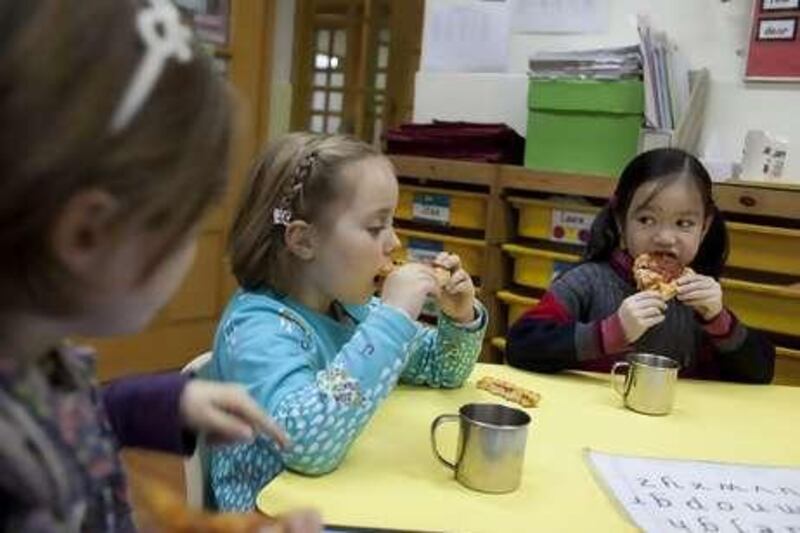BEIJING // Elizabeth Heath has never settled in one place. Now 54, she had a varied upbringing as the daughter of a member of the US navy and has lived throughout her home country, in Spain and in Japan.
As an adult, she gets restless if she stays anywhere too long, perhaps explaining why she moved to Beijing two years ago with her husband and daughter. Mrs Heath is an adult third culture kid, a person brought up at least partly outside their home country. The term derives from the mixing of a person's own culture with the one they are living in to create a third, hybrid identity. Such children have existed for centuries, with many youngsters brought up overseas during colonial times, but researchers believe that their numbers are increasing as the globalised economy pulls more and more people away from home to work. In Beijing alone about 30,000 attend international schools.
"It's enriching, but you tend to lose your roots," Mrs Heath said. "Things are expanded for you, but you lose quite a lot because you don't have that base anymore." Despite viewing her upbringing as a mixed blessing, Mrs Heath did not hesitate to take her daughter, Alzira, 13, abroad. "She's met kids from other cultures she wouldn't have met otherwise. She's thoroughly enjoying it and doesn't want to go back," she said.
Ettie Zilber, the head of Alzira's school, Biss International in Beijing, has worked with third culture children in Singapore, Israel, Spain and Guatemala. Her doctoral thesis was based on research on the subject, and recently she has written a book titled Third Culture Kids: the Children of Educators in International Schools. Ms Zilber said third culture children typically come from well-off socioeconomic backgrounds and live a "fairly privileged lifestyle". They experience travel, learn languages and interact with many cultures. They tend to be confident, good communicators and do well at school, she said.
In their book Third Culture Kids: Growing Up Among Worlds, the sociologists David Pollock and Ruth Van Reken estimated that the number of US citizens living abroad, for example, increased to four million in 2007 from three million in 1990. A study from the 1990s by the US researcher Ruth Hill Useem discovered that third culture children who were US citizens were about four times as likely to graduate from university as compatriots brought up in their home country.
"They're learning to be flexible and they develop an ability to change," Ms Zilber said. Although certain common characteristics had been identified, these manifested themselves in different ways in individuals, she said. A key disadvantage is that they "are constantly saying goodbye". "There's sometimes a lot of unresolved grief from saying goodbye to friends, to family, to nannies," she said. One of Ms Useem's findings was that many third culture children found it "extremely painful" being different from their peers who had not lived abroad, especially when in their late teens and 20s. Many suffered "re-entry problems" and "reverse culture shock" when settling in their home country. However, Ms Zilber said the effects of being a third culture child depended on how long a child was overseas. If it is just a couple of years, before a return to the home country, the results could be different from a complete childhood overseas.
Rich, born in Germany to Thai parents, has spent 12 years outside her home country in places such as Myanmar and the Philippines, thanks to her father's job in Thai diplomatic missions. The 18-year-old Biss student admitted she felt a sense of difference to other Thais. "It's the realisation that I don't really fit in," she said. "They think differently. Sometimes they just say that you're not Thai. I have friends similar to me that travel. I feel that we think more alike."
Her friend Vasudha, 17, also a Biss student, has spent nine years outside her native India in countries such as Australia and Venezuela. She said she "definitely" thinks differently from her compatriots. "Even the Indians here [in Beijing], it's their first time outside India, so they're very different from me. They make fun of things I don't find funny," she said. While third culture children in China develop a unique identity rooted in the local surroundings, there are factors that limit their ability to interact with Chinese children. Only international schools owned by Chinese companies are allowed to recruit Chinese students as well as foreign ones, while others such as Biss and Dulwich College funded by foreign organisations can only take non-Chinese students.
Even if they do mix, Zhang Baohui, an associate professor in the department of political science at Lingnan University in Hong Kong, said he did not believe foreign children have much influence on the thinking of their Chinese counterparts, largely because schoolchildren are too young to be politically aware. "They're not likely to be spreading western values," he said. Of more potential influence in changing the outlook of Chinese people, he said, were their compatriots who had studied overseas and then returned to China, "especially those who've lived and worked for many years in western countries".
dbardsley@thenational.ae






